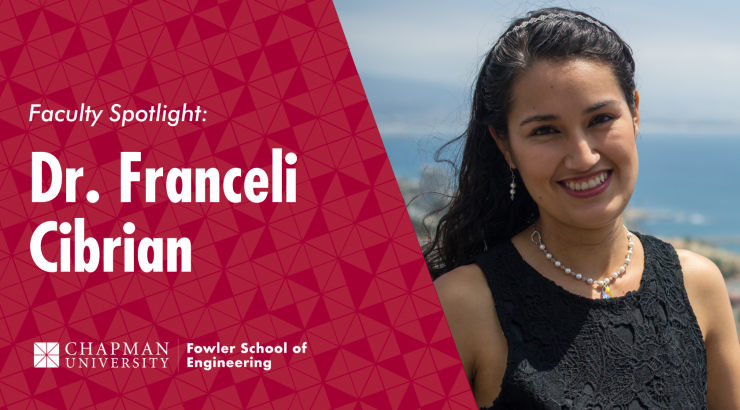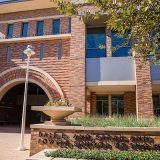
Engineering Faculty Champions Inclusive User-Centered Technology for Diverse Identities Highlighting Dr. Franceli Cibrian’s transformative steps toward engineering for all
June 23, 2023
Across our diverse and ever-changing world, engineers dedicate their careers to producing meaningful work. Using research to make an impact on the lives of minority communities through advanced technology fulfills this motivation for Dr. Franceli Cibrian, an Assistant Professor at Fowler School of Engineering (FSE) who prioritizes bringing the needs of underrepresented groups to the forefront of academic, user-centered research.

In Spring 2023, Cibrian was bestowed the Award in Mentorship of Undergraduate Research and Creative Activity, which recognized her exceptional work in guiding enriching undergraduate research within and beyond the classroom.
Cibrian’s work focuses around the design, development, and evaluation of technology to help people meet healthcare, education, and well-being oriented needs, prioritizing perspectives often overlooked in these fields. “I use user-centered design approaches and find ways to support people facing barriers—marginalized people, diverse populations, and minorities, including those with autism and ADHD,” shared Cibrian. “Right now, commercial technologies target the majority audience; we need technology developed with open-minded perspectives that consider the diverse needs of the whole population, not only the more privileged. We begin by considering real users with real needs from real contexts; we develop products with the understanding that we are not all the same people with identical needs, so it starts with challenging our assumptions.”
While at Chapman, Cibrian has garnered a variety of honors—including the 2023-2024 Award in Mentorship of Undergraduate Research and Creative Activity—and published her first full scholarly text, Research Advances in ADHD and Technology, in 2020. Much of what guides her to achieve these research accomplishments stems from both her lived experiences and intrinsically human-centered approach to academia.

Dr. Cibrian with students Meghna Raswan, Tyler Kay, Ellie Nguyen, and Daisy Fernandez-Reyes at the Center for Undergraduate Excellence’s biannual Student Scholar Symposium—a conference dedicated to showcasing student scholarship, research, and creative pursuits before the greater Chapman community. Photo credit: Adena Hamlin
“What I bring to the table is not industry experience, but rather my experience studying across diverse contexts and in different parts of the world. My Ph.D. and Master’s were from the Center for Scientific Research and Higher Education (CICESE) at Ensenada, Mexico, and I’ve also done research stays at the University of California San Diego (UCSD) and London’s Global University (UCL),” said Cibrian. She also completed her postdoctoral training at the University of California, Irvine (UCI) prior to joining the Chapman engineering community.
Cibrian owes her choice in academic research path in part to her background as a first-generation high school student. “At first I didn’t know what an academic was, but when I learned more I fell in love with research in academia and haven’t left,” stated Cibrian. “These experiences have allowed me to bring my own diverse perspective into the classroom. I try to make classes more accessible because things are not easy for people with backgrounds similar to mine—for example, what happens if you don’t have the resources or your home language is not English?”
In the fall, Cibrian will be bringing her multifaceted perspective into one of the very first masters classes offered at Fowler Engineering—CPSC 516: Human-Centered Computing with a specific focus on Artificial Intelligence (AI). Her course will guide students through the process of creating ethical and accessible AI systems, emphasizing the awareness and drive required to meet diverse physical, cognitive, and social needs while developing technology for everyday use. As with all of her classes, Cibrian intends to ground her students’ understanding through core design guidelines to help ensure that their creations always keep many potential users in mind.
These same aims lie at the heart of her students’ research experiences and accomplishments, underscoring her earnest efforts to cultivate valuable research environments across unique circumstances and identities. Her uIdeas research lab prioritizes equity, diversity, and inclusion, centering their research around five main principles: pursuing inclusion and equitable opportunity, honoring personal well-being, finding pride in one’s research, engaging collaboratively across barriers, and maintaining an ethical approach throughout the process. Under her guidance, Cibrian’s students have worked on a plethora of projects that epitomize engineering for all, such as researching inclusive voice assistants to analyze common speech-to-text algorithms’ approaches to neurodivergent speech. Several of her students’ projects have been successfully published and presented at formal conference settings as recently as June 21, 2023.

Cibrian’s Ubiquitous Inclusive Development of Education, Assistive, and Social Technology (uIdeas) lab philosophy reflects human-centered research practices, demonstrating immense care under the belief that “anyone could do research if they have the environment, tools, motivation, and right project to succeed.”
For Cibrian, being an effective researcher means making active adjustments for a growing world and being open to a diverse range of human experiences—a value she hopes to instill within all of her students. “Be brave and have the courage to explore different ideas. Change is going to happen, so it’s important that when it does, you speak up, show who you are, take risks, and be present. It’s okay to be vulnerable and need support, too; we are stronger together,” said Cibrian.
In the future, Cibrian aims to expand upon her work with recently-developed technologies, assessing how they may more effectively cater to a wide variety of needs. “When I say ‘technology,’ I mean novel ways of interaction: for example, how can we use wearables to support diverse populations and explore interactions that don’t yet exist?” Cibrian said. “I’m most excited about these emergent technologies—wearables, virtual reality, cell phones—because we have to consider what they can tell us about the people using them. What can we learn from this technology that we are not yet seeing and how can we use that knowledge to empower them? Everything I build goes back to this meaningful purpose.”
Those seeking more information about Dr. Cibrian’s extensive research and publications can learn more on her website.

